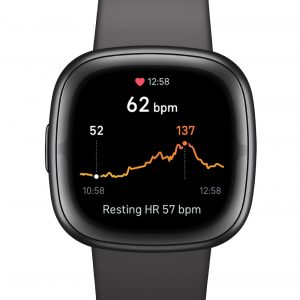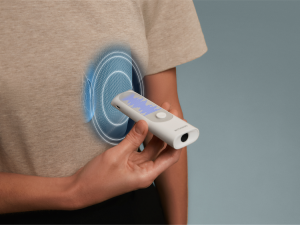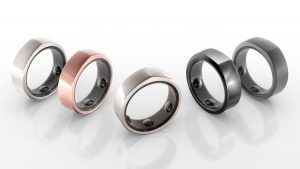
[ad_1]
Did you know that February is Heart Health Month? While you should focus on heart health all year long, of course, the second month of the year is a time when you’re encouraged to help raise awareness of the importance of cardiovascular health. Heart disease is prevalent, the second leading cause of death in Canada for both men and women, according to the Public Health Agency of Canada.
It’s important to keep on top of your heart health. Detecting early signs of an issue is key to prevention, along with focusing on things like healthy eating, getting enough exercise and sleep. There’s so much health tech nowadays designed to help you monitor your heart health and provide alerts, insights, and suggestions.
Start With A Smartwatch
Apple Watch

Fitbit
It all begins with the trusty smartwatch or fitness tracker. Every premium model nowadays, and even many entry-level models, can track your heart rate 24/7. Some, like the Apple Watch and various Fitbit devices provide alerts if they detect an unusually high or low heart rate without a reason (like you just did a workout). This can warn you of a potential issue, like atrial fibrillation. Since historical data is stored in the app and calculated over time, you can see how other aspects of your daily life and habits impact your heart rate, like exercise and sleep, and even monitor your resting heart rate for signs of a decrease or increase.
Using a smartwatch while exercising is also useful so you know when you reach peak heart rate zones to void over-exertion. This also measures your fitness level and heart rate variability over time, looking at how quickly your heart rate can return to a normal level after an intense workout. The
data can be examined alongside other vital measurements, like blood oxygen, cardio recovery, and more. Some models also let you take an ECG at any time.
At-Home Health Devices

Withings BeamO
Health tech has been expanding to include other types of gadgets, from home-based blood pressure monitors to chest heart rate monitors (believed to provide the most accurate readings and thus often used in conjunction with smartwatches by serious athletes), and innovative devices like the Withings BeamO. While the BeamO multi-scope won’t be available until June 2024 and isn’t yet confirmed for Canada, it’s an interesting option that lets you check a variety of vitals from the comfort of your home. It works as a thermometer, can take an electrocardiogram, oximeter, and stethoscope. It’s ideal for use while on a virtual call with a doctor. But you can also use it on your own to capture data more frequently. Track vitals and present the information to a medical professional at your next visit. BeamO is an innovative all-in-one device.

Omron
There are also individual function devices, including finger-based pulse oximeters and arm blood pressure monitors from top brands like Omron. Since the high-tech options work with companion apps, you can take a measurement and the information will be stored so you can view historical data. Many apps even let you download a report. You can see things like how your blood pressure fluctuates from day to day, around times like your menstrual cycle, or based on what you eat, what exercise you do, or how stressed you are that day.
Speaking of which, there are apps, smartwatches, and other devices that measure your stress and mood, too, or allow you to manually input data about how you’re feeling, even why. When you initially log this information, it might not seem important. But looking at it holistically alongside all the other data being captured, you might be able to notice trends and patterns.
This can help you adjust your lifestyle to focus more on heart health. Maybe you find that you have negative numbers when you eat greasy foods or red meat too often, or days you talk a walk lead to better sleep and a lower resting heart rate.
Smart Rings Are All the Rage
The latest innovation in the health and wellness space is smart rings, which function similarly to fitness trackers but are worn around the finger versus the wrist. Typically, you’ll be able to manually log information in a companion app as well as see vitals, measured via blood flow from your finger.

Oura Ring
The Oura Ring has been around for years and remains the leader in this space, but it’s seeing competition from a variety of other brands coming out with their own products, from the Movano Evie Ring to the Circular Ring Slim and the Amazfit Helio Ring; Samsung also confirmed it’s working on a Galaxy Ring.
The Oura Ring can track heart rate 24/7 along with things like blood oxygen, activity, body temperature, and more. An Illness Detection feature monitors shifts in your body temperature and/or heart rate to give you a head’s up if you might be getting sick. The Stress feature, meanwhile, can detect moments of stress and potential triggers so you can make lifestyle habit changes to improve your overall health.
Hearth Health Tips
The Heart and Stroke Foundation provides useful tips for improving your heart health. These might seem simple and obvious, but it’s worth running through the checklist and making sure you follow as many, if not all, that you can.
- Eat well – Make better, heart-healthy food choices whenever you can. It can be small changes like portion sizes, reducing red meat, avoiding greasy foods, or eating more leafy greens.
- Get more exercise – Add exercise to your daily routine, even if you can only handle a low-impact, casual walk. Every bit counts! If weather or obligations at home are a hindrance, consider investing in a treadmill or making small changes, like parking farther away when you go to the grocery store or shopping mall, or taking the stairs at work instead of the elevator.
- Maintain a healthy weight – Staying within a reasonable weight range isn’t just for the sake of appearance, it can have an impact on your hearth health, too.
- Don’t smoke – Smoking can cause heart disease, and that includes exposure to second-hand smoke.
- Manage stress – Use tools at your disposal through devices noted above to monitor your levels of stress and try and pinpoint triggers. Once you do, make positive changes to avoid these triggers or find healthy ways to cope to bring your stress levels down.
-30
More on Health
[ad_2]



